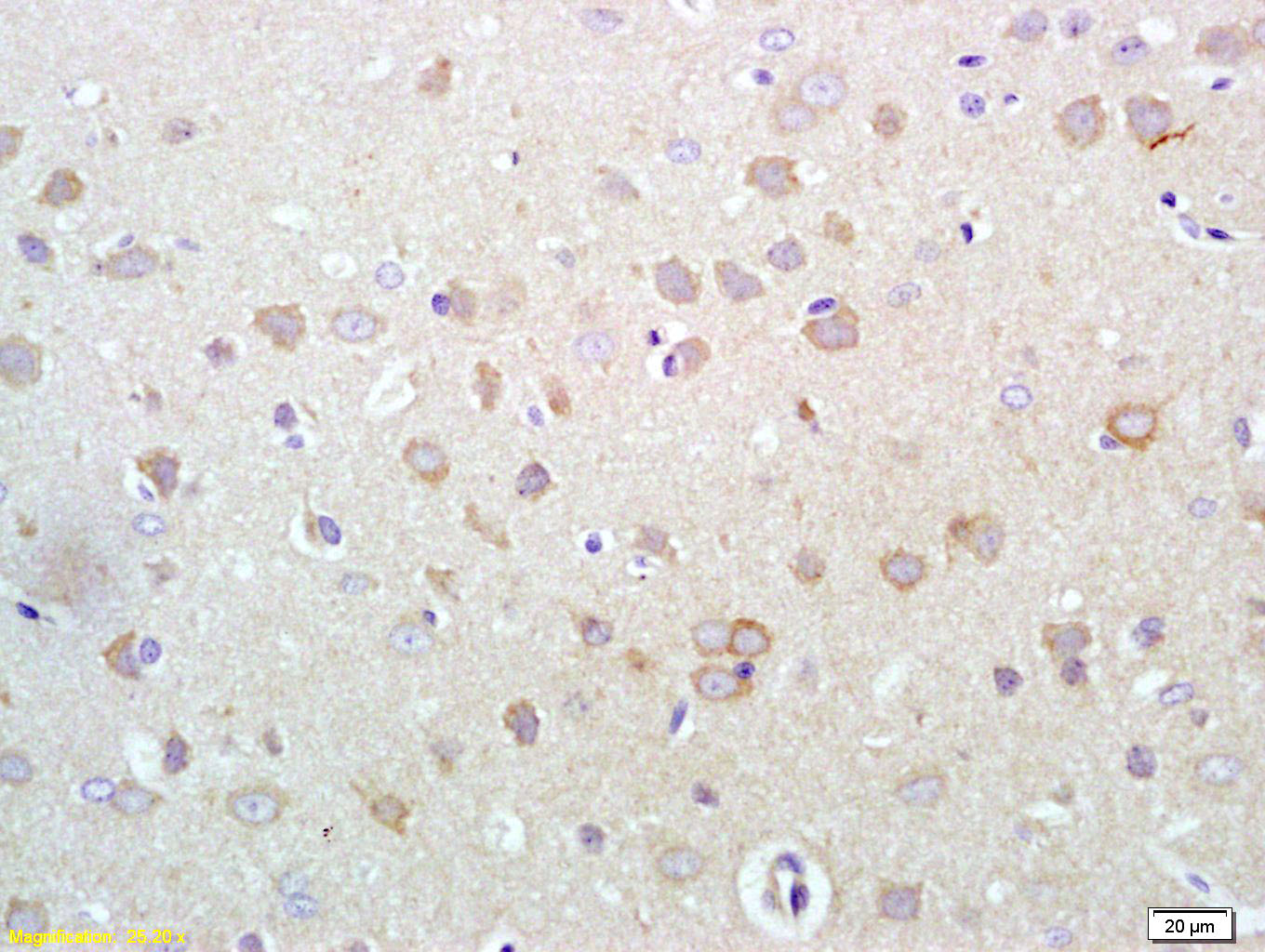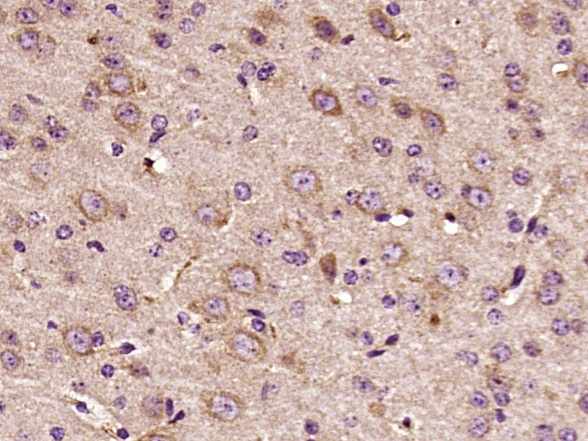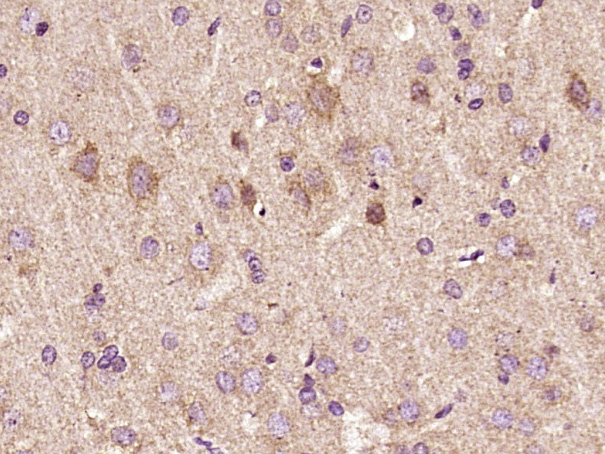
Rabbit Anti-Phospho-ERBB3 (Tyr1289)antibody
Her3/ErbB3(phospho-Tyr1289); p-HRE3 (Tyr1289); ErbB 3 (phospho Y1289); Receptor tyrosine-protein kinase erbB-3; ErbB-3; c erbB 3; c-erbB3; ErbB 3; cerbB3; ERBB3 protein; cerbB; 3erbB3 S; Glial growth factor receptor; HER 3; HER3; LCCS2; MDA BF 1; MGC8803
View History [Clear]
Details
Product Name Phospho-ERBB3 (Tyr1289) Chinese Name 磷酸化HER3抗体 Alias Her3/ErbB3(phospho-Tyr1289); p-HRE3 (Tyr1289); ErbB 3 (phospho Y1289); Receptor tyrosine-protein kinase erbB-3; ErbB-3; c erbB 3; c-erbB3; ErbB 3; cerbB3; ERBB3 protein; cerbB; 3erbB3 S; Glial growth factor receptor; HER 3; HER3; LCCS2; MDA BF 1; MGC88033; p180 ErbB3; p45 sErbB3; p85 sErbB3; proto-oncogene-; receptor tyrosine protein kinase ERB3 [precursor]; Receptor tyrosine protein kinase erbB 3; Receptor tyrosine protein kinase erbB3; Tyrosine kinase type cell surface receptor HER3; V erb b2 avian erythroblastic leukemia viral oncogene homolog 3; v erb b2 erythroblastic leukemia viral oncogene homolog 3 (avian); v erb b2 erythroblastic leukemia viral oncogene homolog 3; ERBB3_HUMAN. Product Type Phosphorylated anti Research Area Tumour Cell biology immunology Signal transduction Apoptosis Growth factors and hormones transcriptional regulatory factor The cell membrane受体 TumourCell biologyMaker Transmembrane protein Immunogen Species Rabbit Clonality Polyclonal React Species Human, Mouse, Rat, (predicted: Dog, Cow, Horse, Rabbit, ) Applications WB=1:500-2000 ELISA=1:5000-10000 IHC-P=1:100-500 IHC-F=1:100-500 IF=1:100-500 (Paraffin sections need antigen repair)
not yet tested in other applications.
optimal dilutions/concentrations should be determined by the end user.Theoretical molecular weight 148kDa Cellular localization The cell membrane Secretory protein Form Liquid Concentration 1mg/ml immunogen KLH conjugated Synthesised phosphopeptide derived from human HER3 around the phosphorylation site of Tyr1289: QG(p-Y)EE <Cytoplasmic> Lsotype IgG Purification affinity purified by Protein A Buffer Solution 0.01M TBS(pH7.4) with 1% BSA, 0.03% Proclin300 and 50% Glycerol. Storage Shipped at 4℃. Store at -20 °C for one year. Avoid repeated freeze/thaw cycles. Attention This product as supplied is intended for research use only, not for use in human, therapeutic or diagnostic applications. PubMed PubMed Product Detail ErbB3 is a member of the epidermal growth factor receptor (EGFR) family of receptor tyrosine kinases. ErbB3 is a membrane-bound protein which has a neuregulin binding domain but not an active kinase domain. It can therefore bind this ligand but cannot convey a signal into the cell via protein phosphorylation. However it does form heterodimers with other EGF receptor family members which do have kinase activity. Heterodimerization leads to the activation of pathways which lead to cell proliferation or differentiation. Amplification of this gene and/or overexpression of its protein have been reported in numerous cancers including prostate, bladder and breast tumors. Alternate transcriptional splice variants encoding different isoforms have been characterized. Isoform 2 lacks the intermembrane region and is secreted outside the cell. This form acts to modulate the activity of the membrane-bound form. Additional splice variants have also been reported but they have not been thoroughly characterized. Defects in ERBB3 are the cause of lethal congenital contracture syndrome type 2 (LCCS2); also called Israeli Bedouin multiple contracture syndrome type A. LCCS2 is an autosomal recessive neurogenic form of a neonatally lethal arthrogryposis that is associated with atrophy of the anterior horn of the spinal cord.
Function:
Binds and is activated by neuregulins and NTAK.
Subunit:
Monomer and homodimer. Heterodimer with each of the other ERBB receptors (Potential). Interacts with CSPG5, PA2G4, GRB7 and MUC1.
Subcellular Location:
Isoform 1: Cell membrane; Single-pass type I membrane protein. Isoform 2: Secreted.
Tissue Specificity:
Epithelial tissues and brain.
Post-translational modifications:
Ligand-binding increases phosphorylation on tyrosine residues and promotes its association with the p85 subunit of phosphatidylinositol 3-kinase. Subject to autophosphorylation.
DISEASE:
Defects in ERBB3 are the cause of lethal congenital contracture syndrome type 2 (LCCS2) [MIM:607598]; also called Israeli Bedouin multiple contracture syndrome type A. LCCS2 is an autosomal recessive neurogenic form of a neonatally lethal arthrogryposis that is associated with atrophy of the anterior horn of the spinal cord. The LCCS2 syndrome is characterized by multiple joint contractures, anterior horn atrophy in the spinal cord, and a unique feature of a markedly distended urinary bladder. The phenotype suggests a spinal cord neuropathic etiology.
Similarity:
Belongs to the protein kinase superfamily. Tyr protein kinase family. EGF receptor subfamily.
Contains 1 protein kinase domain.
SWISS:
P21860
Gene ID:
2065
Database links:Entrez Gene: 2065 Human
Entrez Gene: 13867 Mouse
Omim: 190151 Human
SwissProt: P21860 Human
SwissProt: Q61526 Mouse
Unigene: 118681 Human
Unigene: 373043 Mouse
Unigene: 10228 Rat
Product Picture
Antigen retrieval: citrate buffer ( 0.01M, pH 6.0 ), Boiling bathing for 15min; Block endogenous peroxidase by 3% Hydrogen peroxide for 30min; Blocking buffer (normal goat serum,C-0005) at 37℃ for 20 min;
Incubation: Anti-Phospho-HER3(Tyr1289) Polyclonal Antibody, Unconjugated(SL3491R) 1:200, overnight at 4°C, followed by conjugation to the secondary antibody(SP-0023) and DAB(C-0010) staining
Paraformaldehyde-fixed, paraffin embedded (Mouse brain); Antigen retrieval by boiling in sodium citrate buffer (pH6.0) for 15min; Block endogenous peroxidase by 3% hydrogen peroxide for 20 minutes; Blocking buffer (normal goat serum) at 37°C for 30min; Antibody incubation with (Phospho-HER3 (Tyr1289)) Polyclonal Antibody, Unconjugated (SL3491R) at 1:400 overnight at 4°C, followed by a conjugated secondary antibody (sp-0023) for 20 minutes and DAB staining.Paraformaldehyde-fixed, paraffin embedded (Rat brain); Antigen retrieval by boiling in sodium citrate buffer (pH6.0) for 15min; Block endogenous peroxidase by 3% hydrogen peroxide for 20 minutes; Blocking buffer (normal goat serum) at 37°C for 30min; Antibody incubation with (Phospho-HER3 (Tyr1289)) Polyclonal Antibody, Unconjugated (SL3491R) at 1:400 overnight at 4°C, followed by a conjugated secondary antibody (sp-0023) for 20 minutes and DAB staining.
Bought notes(bought amounts latest0)
No one bought this product
User Comment(Total0User Comment Num)
- No comment





 +86 571 56623320
+86 571 56623320
 +86 18668110335
+86 18668110335

